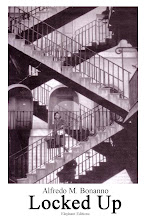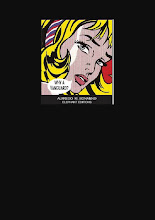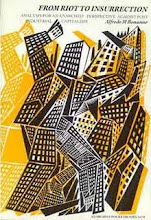Not least the men and structures of power. When such a profoundly subversive movement surges forth and spreads, the instability and precariousness of State order becomes quite evident. Suddenly appearing at various points it spreads like an oil stain and, fruit of so many contradictions, cannot be stopped as some good people maintain simply with a few well-aimed gunshots.
People find it hard to grasp what is taking place in a world where everything has become uncertain. Will they be able to take a bus? Find a post office open? Get to work (anyone who has a job)? Continue to wait patiently in the food queue at the door of some church?
Anarchists are also taken by surprise. They are elsewhere, spread throughout the world, busy going into theories or distinguishing themselves from each other on the basis of metaphysical levels of reciprocal impurity. So they have other things to think about. Insurrection is knocking at the door but they are deaf to it, slow to act.
And, being no exception to the rule, the incredible Albanian insurrection is full of surprises. With one difference. Power knows what needs to be done at the international level. The insurgents also know what to do, at least at the immediate level. After all, for anyone with any sense doing something is the first thing that comes to mind when they find themselves faced with an unforeseen event, whether it gives rise to fear or opens one’s heart to the greatest of hopes.
But really knowing what to do is not so easy.
Although not quite immediate, Power’s response at both local and international level has been that of defending its own interests. Knowing that it will have to give up its position sooner or later, the ruling party is doing everything to put that off for as long as possible, so that their strategic retreat can become a starting point for a mass return to the seats they had to abandon.
At the international level the gendarmes’ boss, the US, has decided it will be the nations most directly interested in the future economic development of Albania to see to things this time: Italy, Greece and Turkey. Italy, which has always played a role in Albania’s ignoble past history, has accepted this task willingly, perhaps for no other reason than to get an opportunity flex its muscles. First, by sinking a ship full of people and drowning them without batting an eyelid; then running the cruiser that was the pride of the navy aground and leaving it stranded on the beach, crammed full of refugees who were trying to leave the country.
These blunders aside, police operations are a routine for any government, and that is what this has become. Bosses of every kind, from the small proprietor of a hat factory who paid “his” workers a fifth of what he would have done in Italy, to the great administrators of the world economy (with the never sufficiently lauded Bank of Rome in the lead), have shared the money rashly invested by the Albanians over the two years between themselves.
But let’s take a closer look at this money that so much has been said about. Through its international intermediaries, in the first place American, the Bank of Rome had been entrusted with a huge sum of money following promises of ridiculously high levels of interest. In fact, the operation was perfect from a capitalist point of view. Some newspapers likened it to “chain letters”, but the comparison does not fit. The game depended on a far greater devaluation of Albanian money than actually happened as a result of the brakes put on due to America’s political concern. When the operation grew out of all proportion their inability to pay interest moved things into the realm of common fraud.
The Albanian people, poverty-stricken as a consequence of the country’s economic conditions, nevertheless had some small savings. Some even had a fair amount from various dealings that recent changes in the geo-political situation had made possible.
Everything poured into the coffers of the Bank of Rome and their international accomplices. It was in response to this situation that the first instances of rebellion broke out. I have heard the reprimands of revolutionaries who cannot see what “tone” a revolt born from the desire to get one’s money back can have. They obviously do not understand the objective and subjective mechanisms that engender surprise, frustration, disdain, hate, rebellion, and generalised insurrection.
I am not saying that these mechanisms can be explained once and for all. When the breakdown occurs, everything spreads uncontrollably, and that is what has happened.
But an insurrection is not a “pure” event. It cannot be seen as a linear process that leads straight to victory (but what victory?), or retreats and extinguishes itself in defeat (but what defeat?). Here lies the crux of the problem.
The step from rebellion to generalised insurrection is not a simple one, nor is it one that is devoid of consequences. Things do not move spontaneously in one direction. Albania is no exception and after the first days of the revolt and the assaults on the prisons and army barracks, the rebels are gradually moving towards more moderate, broader demands such as the nomination of a government, parliamentary elections, the resignation of the director of State radio and television, as well as all the normalising requests for personal protection (amnesty, no proceedings against the insurgents, etc.).
We must look at this question for a moment as it is acquiring dimensions of extreme and tragic importance. Many comrades think that the answer to the problem “What is to be done?” in such cases is to participate in the insurrectional movement directly themselves. In a word, move in the opposite direction to the clandestine refugees: go over there, shoulder the gun and play at who shoots first.
This idea is superficial, to say the least. You can’t turn up out of the blue in a strange context without running the risk of being taken for an enemy and hanged from the nearest lamp post. It is necessary to have organisational contacts, even minimal ones, before events get underway. We do not mean great operational structures, but it is certainly necessary to know someone already, someone who is capable of understanding what is actually happening.
This should not come as a surprise. Since the collapse of the Berlin Wall the economic and political disintegration of the Russian empire has produced, and will continue to produce, many situations similar to that of Albania or Bosnia in the Balkans right along the whole Russian border, and even within Russia itself.
Direct participation is only possible if there is a point of reference on the spot to prevent it from turning out to be a disastrous failure before it even begins. But could this, let’s say active, therefore armed and conscious, revolutionary presence give any valid support to the revolt during its swift transformation to generalised insurrection?
There is no simple answer to this. Some things can clearly be denounced as soon as they come to light of course. These might be the formation of gangs led by the leaders of the old power structures, the presence of elements of the secret police (in the case of which no swearing of loyalty can be considered valid), attempts to re-organise the authoritarian political parties, right and left, control or repression of the self-managed forms appearing in the field of services or production, etc.
At the same time there needs to be a theoretical and practical contribution, not just concerning strictly theoretical or political questions (such as a detailed critique of the authoritarian structure of the Communist Party or the no less authoritarian forms of democratic governments), but also in order to make known structures that are forming within the insurrectional movement elsewhere. Then, and only then, will an international connection and an active participation of insurrectionalist movements elsewhere in the world—which are different but have similar characteristics—become possible.
I am not talking of specific organisations such as unions or workers’ councils but rather of an active presence, a co-ordinated participation that can keep the theoretical value of the barricades alive and extend them, as opposed to simply waiting for their flame to extinguish.
After all, isn’t the great desire of each one of us to find ourselves prepared when the next revolt breaks out? What better then than to contribute to making these revolts spread wherever they start up, as well as revealing the premonitory signs of rage and hatred of exploitation in all its forms, concretely, now?
Rebibbia prison, July 1997
Alfredo M. Bonanno
Alfredo M. Bonanno












